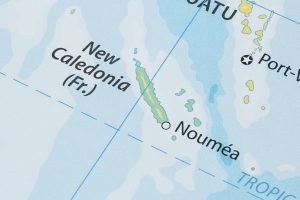In a stunning display of brinkmanship, Daniel Goa, the president of the Union Calédonienne (UC), made a provocative statement in a recent speech. “France has deceived us so thoroughly that our sovereignty must be immediate, full, and non-negotiable,” he declared, suggesting September 24, 2024 – the 171st anniversary of the French takeover of the territory – as the date to proclaim it. This date was initially mentioned by the UC before they later proposed September 24, 2025, instead.
Far from being a mere change of date, it lays bare the deep fractures within the independence movement, revealing how the struggle for self-determination has become increasingly fraught with internal conflict and fragmentation.
Divisions within the Kanak independence movement are deepening, with the Front de libération nationale kanak et socialiste (FLNKS), which unites the main pro-independence forces, becoming increasingly fragmented. The Kanak Liberation Party (Palika) and the Progressive Union in Melanesia (UPM) boycotted the FLNKS Congress on August 30 and 31.
The inclusion of militants deemed radical, especially within the CCAT (Cellule de Coordination des Actions de Terrain, or Field Action Coordination Cell), and the UC’s support for controversial figures have widened the rift between different factions of the movement. Moderates fear that this rise of the radicals will permanently close the door to any future negotiations, while the more extreme elements see these actions as a necessary step toward independence.
Despite this, the FLNKS, during its 43rd Congress, appointed Christian Tein, leader of the CCAT, as its president. This is largely a symbolic nomination, as Tein is currently in provisional detention in mainland France, accused of several crimes. This choice reflects the growing influence of both the UC and CCAT within the movement, with Tein’s candidacy being supported by both groups, particularly the UC after a meeting in the city of Voh.
The recent political shake-up has only added to the uncertainty. Roch Wamytan, a historical leader in the independence movement, was ousted from his position as president of the Congress, replaced by Veylma Falaeo, a candidate backed by loyalists and the Calédonie Ensemble party. This unexpected defeat was seen by many pro-independence supporters as a “surprise” for some, and “warnings” that went unheard for others.
The consequence of this power shift is a weakened and disorganized independence camp. The removal of Wamytan from the leadership role has not only highlighted the fragility of the independence coalition but has also sparked a loss of confidence in the movement’s ability to deliver on its promises.
Compounding the internal turmoil in New Caledonia is the paralysis of the French government, currently restricted to managing routine affairs following the dissolution of the National Assembly by President Emmanuel Macron in June 2024. Michel Barnier, the new prime minister, has yet to appoint a full government. Macron’s delay in nominating a new prime minister left France with a caretaker government unable to implement meaningful policy responses, particularly regarding the crisis in New Caledonia.
The timing of this governmental standstill could not be worse. New Caledonia faces a cascade of socioeconomic crises. The closure of the Koniambo nickel mine at the end of August 2024 resulted in 1,200 job losses. The vacuum has only deepened local frustrations and heightened a sense of abandonment among New Caledonians. At the same time, the Société Immobilière de Nouvelle-Calédonie (SIC), the island’s main social housing provider, faces imminent liquidation, threatening to leave thousands of families without homes.
Faced with the French government’s inability to act, the New Caledonian government has taken matters into its own hands. It has launched an online public consultation to involve the public in reshaping the territory’s economic, social, and institutional frameworks. Contributions will be gathered until mid-September, with the final goal of submitting them to the French government for inclusion in the 2025 budget law. The question is whether these efforts will bridge the deepening divides or merely paper over cracks that are widening by the day.
Amid this tangled web of political, social, and economic crises, time is running out for New Caledonia. The local government of New Caledonia requested a massive financial aid package from France – 4.2 billion euros ($4.6 billion) – to rebuild following recent riots. However, with Paris unable to provide swift responses, the island’s economic and social challenges continue to grow.
While Macron has promised to re-engage with local actors, the lack of a functioning French executive casts doubt over any real progress.
While hopes were initially placed on the potential appointment of Bernard Cazeneuve, who had advocated for a more measured and peaceful approach to New Caledonia – as he outlined in a recent article in L’Opinion – the decision to appoint Barnier as prime minister marks a significant shift in strategy. Macron’s choice of Barnier, a seasoned negotiator with a firm stance against New Caledonian independence, indicates a determination to maintain the territory’s status within France. However, this decision is likely to deepen tensions with pro-independence factions, who perceive it as a dismissal of their democratic will.
Barnier’s appointment comes at a critical moment for France’s overseas territories, with New Caledonia at the forefront of this challenge. The former European Commissioner will need to carefully navigate the complex landscape, balancing the region’s desire for greater autonomy with France’s strategic interests. The outcome of Barnier’s tenure will not only shape the future of New Caledonia but also test France’s broader commitment to its overseas territories in an increasingly uncertain global environment.
Already in 1996, Barnier had spoken of New Caledonia’s institutional future, emphasizing the importance of defining the nature of its link to France, increasing local responsibilities, and ensuring balanced economic and social development for the territory.
New Caledonia stands at a crossroads. The island’s future hangs in the balance, and the time for half measures has long passed.

































